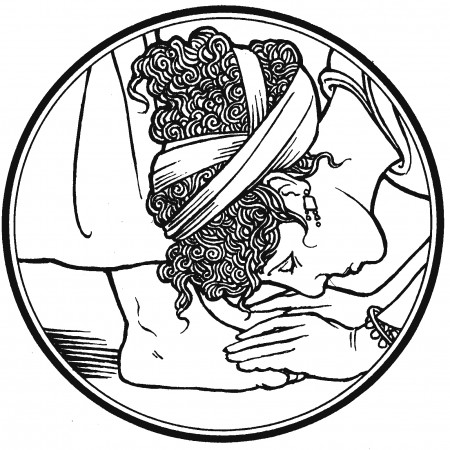The Second Sunday in Lent
Matthew 15:21–28
+ IN NOMINE IESU +
Suffering is an invitation to despair. It leads us to question whether God our Father in heaven loves us. It creates in us doubts whether God is truly good. It quells all hope. It’s difficult not to fall into despair when suffering infiltrates our lives. Whether it be childlessness, physical or emotional distress, heartbreak at not realizing your own dreams or the dreams of those you love. It can feel as though you’re wrestling with God, like Jacob. It can feel like God is your enemy and not your Father, as though God has forgotten you and does not love you, like the Canaanite woman.
God our Father in heaven is calling us to Himself, calling us home to live with Him in His eternal kingdom. And so we are on a journey with Jesus Christ to our true home with Him in heaven. But there’s a strange thing about the way God calls us home. We ask for daily bread in the Lord’s Prayer. And we learned from the Catechism that daily bread includes everything that has to do with the support and needs of the body, such as food, drink, clothing, shoes, house, home, land, animals, money, goods, a devout husband or wife, devout children, devout workers, devout and faithful rulers, good government, good weather, peace, health, self-control, good reputation, good friends, faithful neighbors, and the like.” And we know that all those are gifts of God to us in this life. And it’s all going to be taken away from us, sooner or later, bit by bit or in one fell swoop.
Losing these things could lead us to despair. It is painful to suffer. But despair loses sight of what God is doing when He, in His wisdom, allows us to lose things in this life. It loses sight of who is calling us and to where He is calling us. For God is calling us home. It’s as if He is saying, “It’s okay to leave all that stuff in the place of your earthly sojourn. It hurts to lose it but I’m calling you to something better. I’m calling you to myself.” The suffering we endure, the crosses we bear are custom made for us. They call us to release our control, our trust and hope in these things, and trust and hope in our Father in heaven only.
For the opposite of despair is hope, and hope in the resurrection. And leaving despair behind means clinging to the words of Jesus as He leads us into the future. Through repentance we leave despair behind and through faith we trust and hope in the promise of the resurrection to come. And this is precisely what the the Canaanite woman did. For she had every reason to despair. She had every reason to lose all hope. But she didn’t. She steadfastly clung to the Word of Christ.
She cried out to our Lord for help, for mercy, His undeserved love and kindness. She asked Him to heal her daughter. First, Jesus was silent, seemingly ignoring her. He answered her not a word. It often seems the case that God is ignoring us, and yet He promises just the opposite in His word. He tells us that he hears. That he is always more ready to hear than we are to pray. And what does she do? Does she get angry? Does she blame God? Does she curse God? No! With humility and hope, she cries out all the more, to the point that even the disciples plea to Christ on her behalf.
And then Christ says, “I was sent only to the lost sheep of the house of Israel.” This is a harsh response. It appears as though our Lord is saying that she is not part of the Elect, that she is not one of the children of God. And she responds with humility not anger. She hopes and does not despair. She cries out again: Lord, help me! It is as if she said, “I can not see into the mind of God to know whether I am elect or not. And it is true, I am not an Israelite. But what does that matter? I cling not to my blood, but to the Word of God and the blood that you will shed as the Word reveals it to me. For you desire mercy not sacrifice. You gave your blood on the cross for all, for God loved the world by giving you that all who trust in you will live. Your word and promise is enough because it gives grace and mercy to all sinners without exception.
And then our Lord said, “It is not right to take the children’s bread and throw it to the dogs.” And what did she do then? How did she respond to these harsh words? She did not give in to despair but clung to hope in the Savior. And so she acknowledged the truth of Christ’s words and second she availed herself of Christ’s own words. She said, “Yes Lord, but even the dogs eat the scraps from the master’s table.” It is as if she said “You are right. By nature I am a heathen, a Canaanite by birth and blood. I am like a dog that can lay no claim to the right of a child. I am a dog. So at least you mean to grant me what one gives even a dog, a little crumb of your grace that falls from the table of your children. And this is enough. I would rather be a dog in your house than a child of the world or of the devil. Give me your crumbs, which satisfy and give life to the full. Despair cannot have her because her hope is in the God who was crucified, died, raised on the third day, and ascended into heaven.
And you can almost see the smile on his face and hear it in the words he spoke to her: “O woman, great is your faith! Be it done for you as you believe.” For the Lord desires nothing more than to give His gifts to those who trust in Him. As it is written, seek and you will find, knock and the door will be opened to you, ask and it will be given to you in good measure, pressed in your lap. He desires mercy not sacrifice. And he gives his mercy freely not because we have earned it but because he loves us. And that is why he came. He came to be a sacrifice of mercy in our place, to take away our sins, to give us life, and to comfort us in the times of our need. To give us hope and drive away despair.
Temptations to despair will come. Suffering and affliction will be with us always. And just as fire purifies gold and silver, burning up all the impurities, and just as it tempers steel, making it stronger, so it is that our Lord uses suffering and affliction, trial and testing to purify us and strengthen our faith. For our Father in heaven uses these things for our good, so that we do not become complacent but hope all the more for our homecoming in heaven. For suffering and affliction produce endurance; and endurance produces character; and character produces hope; and hope does not put us to shame because the love of the Father is pouring into our hearts through the Holy Spirit by the Word and promise of God (Rom 5:3–5). And this hope raises us up heavenward to fix our gaze upon the greater glory that shall be ours.
Jesus is coming again to take you from this valley of sorrows, from this place of tears shed because of sin and death, to bring you to your heavenly home. Leave all despair behind, and hope in the promises of God. Cling to and trust in them. For in so doing, these Words of Christ will be spoken to you, “Great is your faith. Let it be done unto you as you believe.” Amen.



0 Comments